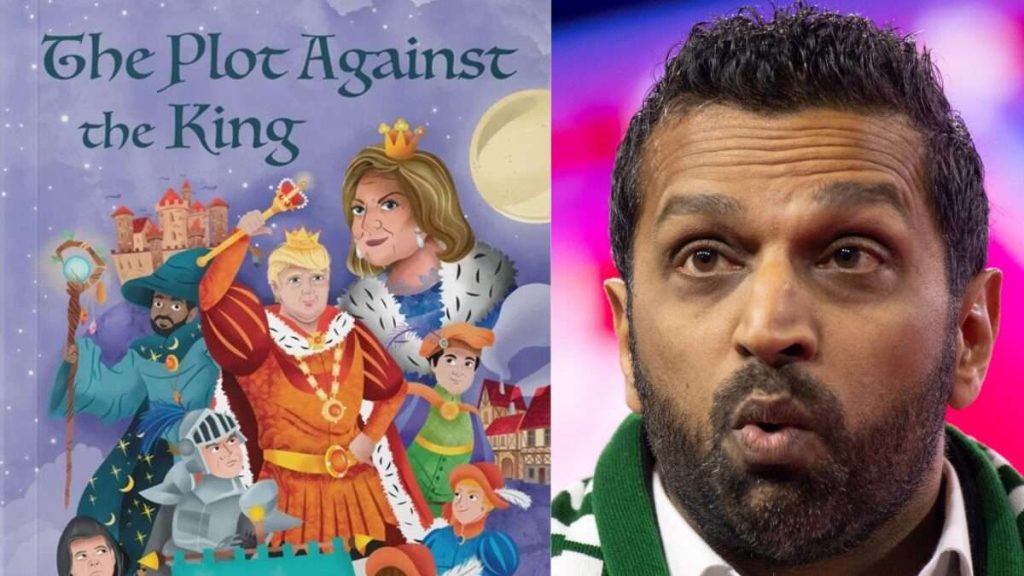
Donald Trump has repeatedly declared that various people who have crossed him, including state and federal prosecutors, members of Congress, and President Joe Biden, should be investigated, prosecuted, and jailed. But in a Meet the Press interview on Sunday, the president-elect said he would not direct his subordinates to follow through on those threats after he takes office on January 20. Trump told the show’s host, Kristen Welker, he would instead leave those decisions to his appointees at the FBI and the Justice Department.
That commitment is not exactly reassuring, since Trump’s pick to run the FBI, Kash Patel, has repeatedly threatened to “come after” Trump’s political opponents, including journalists as well as current and former government officials. Patel published an enemies list as an appendix to his 2023 book Government Gangsters, which alleges a “Deep State” conspiracy against Trump that Patel equates with a conspiracy to subvert democracy and the Constitution. The list, which includes 60 names, is limited to people who have served in the executive branch. Patel notes that it does not include “other corrupt actors of the highest order,” such as Rep. Adam Schiff (D–Calif.), Rep. Eric Swalwell (D–Calif.), and “the entire fake news mafia press corps.”
The list nevertheless covers a lot of ground. It includes Biden, Vice President Kamala Harris, former Secretary of State Hillary Clinton, Attorney General Merrick Garland, former Attorneys General Eric Holder and Loretta Lynch, FBI Director Christopher Wray, former FBI Director James Comey, Special Counsel Robert Hur, and sundry Trump appointees who have been critical of the former and future president, such as former Attorney General Bill Barr, former Defense Secretary Mark Esper, former Joint Chiefs of Staff Chairman Mark Milley, and former National Security Adviser John Bolton.
All these people have irked Trump and his supporters in one way or another. In his Meet the Press interview, for instance, Trump complained that Wray, whom he appointed to run the FBI but now wants to replace with Patel, “invaded my home”—a reference to the August 2022 FBI search of Mar-a-Lago, which turned up 102 classified documents that Trump was supposed to have surrendered in response to a federal subpoena. Trump also faulted Wray for initially suggesting that Trump might have been injured by “shrapnel” rather than a bullet during the July 2024 attempted assassination at a rally in Pennsylvania.
According to Patel, Wray and the rest are guilty of “crimes” that justify their prosecution. Patel is hazy on the exact nature of those crimes.
“We will go out and find the conspirators—not just in government, but in the media,” Patel told former Trump strategist Steve Bannon during an interview in December 2023. “Yes, we’re gonna come after the people in the media who lied about American citizens, who helped Joe Biden rig presidential elections. We’re gonna come after you. Whether it’s criminally or civilly, we’ll figure that out.”
Patel seems to have a lot of confidence in his ability to “figure that out.” His alter ego in his 2022 children’s book The Plot Againt the King, which allegorically explains how Trump’s enemies conspired to falsely implicate his 2016 presidential campaign in “collusion” with the Russian government, is “a wizard called Kash the Distinguished Discoverer.” Kash “was known far and wide as the one person who could discover anything about anything,” Patel writes. “He found the Holy Grape, deep in the Enchanted Forest, and he discovered who had stolen the sleeping princess.”
Trump, for his part, has argued that former Rep. Liz Cheney (R–Wyo.) and every other member of the House select committee that investigated the January 6, 2021, riot at the U.S. Capitol are guilty of “treason,” which is punishable by death or by a prison sentence of at least five years. A person commits that crime when he “ow[es] allegiance to the United States” and “levies war against them or adheres to their enemies, giving them aid and comfort within the United States or elsewhere.”
In case that does not seem like a good fit for legislators who looked into the circumstances of the attack on the Capitol by Trump supporters, the president-elect also claims that “the January 6th Unselect Committee got rid of EVERYTHING,” meaning the evidence it had collected. According to Trump, all of it was “Discarded, Deleted, Thrown Out,” which was a “Flagrant Violation of the law” and “AN EGREGIOUS CRIMINAL ACT.”
Since the committee published an 800-page report and released voluminous “supporting materials,” including transcripts of interviews and depositions, Trump’s charge is obviously not true. In a July 2023 letter, Rep. Bennie Thompson (D–Miss.), who chaired the committee, noted that it had published and archived “more than 1 million records.” He added that “the Select Committee did not archive temporary committee records that were not elevated by the Committee’s actions, such as use in hearings or official publications, or those that did not further its investigative activities.”
Unfazed by that explanation, Trump told Welker that “everybody on that committee…should go to jail.” But he said he would not instruct his FBI director or his attorney general to make sure that happened. “I think that they’ll have to look at that,” he said, “but I’m not going to—I’m going to focus on drill, baby, drill.”
In response to those remarks, Cheney re-upped her criticism of Trump’s reckless conduct before and during the Capitol riot, which she described as “the worst breach of our Constitution by any president in our nation’s history.” She added, “Donald Trump’s suggestion that members of Congress who later investigated his illegal and unconstitutional actions should be jailed is a continuation of his assault on the rule of law and the foundations of our republic.”
It is hard to say whether Trump really means any of this or is just trying to get a rise out of his critics. (If the latter, mission accomplished!) His fundamental lack of seriousness was apparent when Welker noted his repeated promises to “appoint a real special prosecutor” who would investigate “the Biden bribery and crime ring.”
Trump suggested that Welker had made those promises up. “Where did I say that?” he asked. She offered an example: “You said that on Truth Social, June 12, 2023: ‘I will appoint a real special prosecutor to go after the most corrupt president in the history of the United States, Joe Biden.'”
His memory refreshed, Trump said it is “true” that Biden is the most corrupt president in U.S. history. But he suggested that, contrary to what he said during his campaign, he did not plan to do anything about that. “I’m really looking to make our country successful,” he said. “I’m not looking to go back into the past. I’m looking to make our country successful. Retribution will be through success.”
Welker pressed Trump. “You wrote on Truth Social in 2023 that you’re going to appoint a real special prosecutor to go after Joe Biden,” she noted. “Now you’re saying you’re not going to do that.”
Trump backpedaled from his backpedaling. “I’m not doing that unless I find something that I think is reasonable, but that’s not going to be my decision,” he said, adding that he would defer to Patel and Pam Bondi, his pick for attorney general. “That’s going to be Pam Bondi’s decision, and, to a different extent, Kash Patel, assuming they’re both there, and I think they’re both going to get approved. But I—I—you know, while you ask me that, what they’ve done to me with weaponization is a disgrace.”
As Trump sees it, the Democrats weaponized government by pursuing two impeachments and two federal indictments against him. Trump thinks he therefore would be fully justified in weaponizing government by pursuing a criminal investigation of Biden. In other words, turnabout is fair play.
Welker asked Trump about Patel’s enemies list. “You campaigned on destroying the Deep State,” she noted. “Do you want Kash Patel to launch investigations into people on that list?”
If that is what Patel wants, Trump replied, then yes. “He’s going to do what he thinks is right,” he said. “If they think that somebody was dishonest or crooked or a corrupt politician, I think he probably has an obligation to do it.”
Does Trump expect Patel to “pursue investigations against your political enemies?” Welker asked again. “If they were crooked, if they did something wrong, if they have broken the law, probably,” he said. “They went after me. You know, they went after me, and I did nothing wrong.”
Although Trump insisted that “Kash Patel is very fair,” that does not seem like an apt description of someone who announces, before any investigation has been conducted, that he intends to “come after” specified people for unspecified “crimes” and will figure out the details later. While that mission presumably would be easy for Kash the Distinguished Discoverer, a wizard who can “discover anything about anything,” in the real world Patel might have trouble criminalizing opposition to Donald Trump. And if he tried to do that, the legal scholar Paul Rosenzweig notes, the defendants in any resulting criminal cases would have a strong case that they were victims of vindictive prosecution, which ordinarily is a hard claim to substantiate.
“Patel has gone a long way to supporting a claim of vindictiveness and helping defendants who might be charged to make their case,” Rosenzweig writes. In addition to the Government Gangsters list and the aforementioned December 2023 interview with Bannon, Rosenzweig notes a 2024 interview in which Patel promised “the retribution of prosecution and civil suits against political opponents for ‘borderline treason.'” In another interview with Bannon, “Patel list[ed] a number of names (including by reference all of the people from his enemies list)” before concluding that “these people need to go to prison.”
As Rosenzweig notes, “These are not the words of a neutral investigator. Rather, they are stark evidence of a predisposition to prosecution and strong circumstantial evidence of vindictive intent. Patel has already identified who needs to be prosecuted and what their crimes appear to be—all without the benefit of having conducted a criminal investigation.”
The possibility that prosecutions might ultimately be blocked, of course, does not mean that Patel, as director of the FBI, could not inflict punishment on Trump’s enemies. “Even being subject to a federal investigation is a significant burden—in time, money, attention, and mental stress, not to mention the possibility of public harassment,” Rosenzweig notes. “Dismissal of any indictments brought may be some surcease, but it will be cold comfort indeed to those whom Patel and Trump target.”
The post When Deciding Whether To Investigate His Opponents, Trump Says, He Will Defer to ‘Very Fair’ Kash Patel appeared first on Reason.com.







